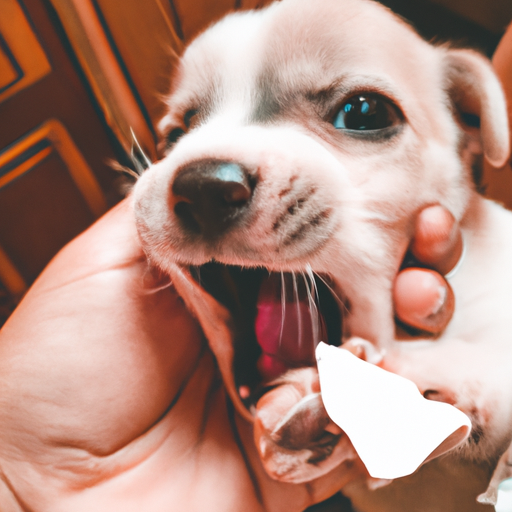As a caregiver, you’re probably no stranger to the endless curiosity that comes with raising a puppy. One of the questions you might have is: “When do puppies lose their baby teeth?” This article will give you a comprehensive insight into this topic and answer all of your questions in detail.
Understanding Puppy Teeth Development
Firstly, it’s crucial to understand that puppies, like humans, go through two sets of teeth in their lives: the deciduous (baby) teeth and the permanent (adult) teeth. Puppies are actually born toothless and start developing their baby teeth around three to six weeks of age.
There are 28 baby teeth in total, including:
- 12 incisors
- 4 canines
- 12 pre-molars
When Puppy Teeth Start to Fall Out
Puppies generally start losing their baby teeth between three to seven months of age. The process is gradual, and the baby teeth will fall out one by one, making room for the permanent teeth to grow.
Here’s a general timeline:
- Incisors: 3-4 months
- Canines: 4-5 months
- Pre-molars: 5-6 months
Remember, this is a rough guide and each puppy is unique.
Signs That Your Puppy Is Teething
Just like human babies, puppies also show signs when they are teething. Here are some signals to look out for:
- Increased chewing and biting
- Drooling more than usual
- Decreased appetite
- Red, swollen gums
How to Help Your Teething Puppy
Teething can be a painful process for your puppy. Here are some ways you can help:
- Provide chew toys: Chew toys can provide relief from the discomfort of teething. Ensure they are safe and suitable for puppies.
- Use frozen treats: Frozen carrots or ice cubes can help soothe sore gums.
- Regular check-ups: Keep a close eye on your puppy’s mouth to ensure the teeth are growing properly.
What to Do If Baby Teeth Don’t Fall Out
In some cases, a puppy’s baby teeth don’t fall out on their own, a condition known as retained deciduous teeth. It’s most common in small breed dogs. If you notice this, contact your vet as the retained teeth may need to be extracted to avoid dental problems.
Adult Teeth in Puppies
By the time your puppy is about seven months old, all their adult teeth should have come in. There are 42 adult teeth in total:
| Tooth Type | Number |
|---|---|
| Incisors | 12 |
| Canines | 4 |
| Pre-molars | 16 |
| Molars | 10 |
Puppy Dental Care Tips
Maintaining your puppy’s dental health is essential. Here are some tips:
- Start early with dental hygiene habits.
- Use a dog toothpaste and toothbrush.
- Regular dental check-ups at the vet.
- Monitor for signs of dental disease.
FAQs
1. When do puppies start teething?
Puppies generally start teething around three to six weeks of age when their baby teeth begin to come in.
2. When do puppies lose their baby teeth?
Puppies begin to lose their baby teeth and start developing adult teeth around three to seven months of age.
3. What can I give my puppy for teething pain?
Safe chew toys, frozen treats, and pain relief medication (if recommended by your vet) can help soothe teething pain.
4. What if my puppy’s baby teeth don’t fall out?
If your puppy’s baby teeth do not fall out and the adult teeth start to come in, consult your vet. They might need to extract the baby teeth.
5. How many teeth do adult dogs have?
Adult dogs typically have 42 teeth.
Caring for a teething puppy can be a challenging but rewarding experience. By understanding the process and knowing how to provide proper care, you can help your puppy transition smoothly from their baby teeth to their adult teeth.



